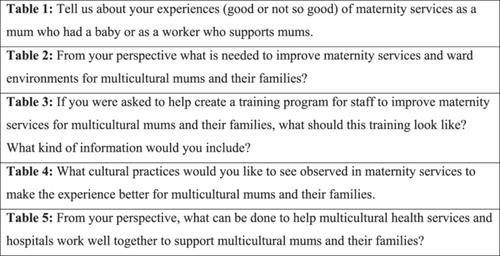Cultural Humility in Action: Learning From Refugee and Migrant Women and Healthcare Providers to Improve Maternal Health Services in Australia
Abstract
Introduction
Access to culturally appropriate healthcare is vital to ensure refugee and migrant women receive optimal care, particularly during the perinatal period. Refugee and migrant women report lower satisfaction with pregnancy care due to language barriers and a perceived lack of understanding of their needs. The aim of this study is to explore how to improve the experiences of migrant and refugee women with maternal health services through the lens of cultural humility.
Methods
Working collaboratively with maternal health service providers and managers and local refugee and migrant women, this research project used a World Café methodology to provide these stakeholders with an opportunity to discuss maternal healthcare in the region. World Café participants (n = 34) included women from multicultural backgrounds (n = 20), maternal healthcare providers such as midwives, social workers and management (n = 5) multicultural healthcare providers (n = 7) and a community-based birth educator (n = 1). Data were analysed thematically.
Results
A key finding of the World Café was the need for staff training that is co-designed and co-delivered with members of multicultural communities and healthcare providers to enhance the practice of cultural humility. Training should focus on women's stories that capture the cultural nuances around pregnancy and birthing, their support needs including trauma-informed care, and the importance of effective cross-cultural communication.
Conclusion
This research gave refugee and migrant women a voice in future decision-making, specifically in maternal health staff training. The refugee and migrant women shared their perspectives on how to enhance cultural humility practices in maternity services for them. The research has led to opportunities such as community-based antenatal classes and improvements in maternity services development strategies.
Public Contribution
The project actively engaged with maternal healthcare providers, multicultural and refugee healthcare providers and women from multicultural communities in the design of the project and as participants. Their expertise and experience have been invaluable and have informed pilot programmes that emerged from this study.


 求助内容:
求助内容: 应助结果提醒方式:
应助结果提醒方式:


